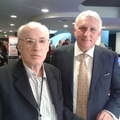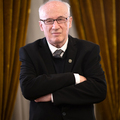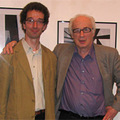FOREWORD For Istvan Szarvas's Asked-they Answered VIII.
The reader is holding the eighth volume of István Szarvas’s interview series titled “I Asked – They Answered.” In recent years, publishing a new selection of interviews has become something of a tradition. The seventh volume came out last year, and the sixth was published in 2022. It is a special honor that István has once again asked me to write the Foreword.
István Szarvas began his career in general journalism in 1991 and turned to the more specialized field of interviews in 2008. We can count ourselves fortunate, as over the past 33 years, he has published nearly 600 print articles and more than 1,000 online pieces—including interviews, book reviews, and reports on various events ranging from science and healthcare to sports and gastronomy—enriching Hungarian journalism in the process.
His preparation and attitude toward interviews, along with his humility, are exemplary. As summarized by Dr. Vitéz Albert N. Békássy, an emeritus pediatric oncologist professor living in Sweden, in the introduction to the seventh volume: "Thanks to his extensive network, doors open for him, and in his interviews we hear from distinguished and renowned public figures from Hungary and abroad—prime ministers, heads of state, Olympic champions, ambassadors, leading artists, and church dignitaries."
His accomplishments are all the more impressive considering that in 2025, the author is celebrating his 81st birthday, to which I wish him continued health, happiness, and many more years of creative vitality!
The eighth volume of “I Asked – They Answered” continues the tradition of previous editions, featuring a mix of older and newer interviews. Of the 33 interviews, nearly one-third are from before 2009—including three from the 1990s. Eight interviews were conducted in the 2010s, and thirteen after 2021. The individuals featured in this book are incredibly diverse. István Szarvas interviews economic experts (CFOs, CEOs, managing directors), artists (actresses, actors, film directors, cinematographers, cellists, artistic directors, and a conductor awarded the Liszt Ferenc Prize), scientists (a Nobel Prize-winning astronomer, a Nobel Prize-winning biology professor, a university dean, and an academic), politicians, ambassadors, and even a Paralympian.
Three ideas stood out to me from this collection of interviews.
The first is the theme of mentorship or education. I found it fascinating that—despite their differences—a software company CEO (Ervin Szabó), a cellist and artistic director (István Várdai), and a Liszt Prize-winning conductor (György Vashegyi) all consider educating the next generation to be a key responsibility.
The second is the topic of artificial intelligence, discussed in the interview with Bálint Békefi. Through it, I too felt personally addressed. According to the interviewee, "This is an area many would prefer to ignore, something we’d rather not think about. We believe it doesn’t affect us, that we don’t need it—but I think it’s only a matter of time before we all have to confront it."
I must admit, I too am among those who would prefer to ignore it—not just because I believe it copies, steals, and often makes mistakes, but also because I don’t understand why we want to "outsource" or "mechanize" human creativity. But that’s just my personal opinion. Let’s see if the time will come when I too begin to engage with it!
Lastly, I’d like to touch on the issue of relevance. Many people think that older interviews lose their relevance over time—but that’s simply not true! A great example is the 13-year-old interview with Kati Marton, the Hungarian-born American journalist and author, who warns of the dangers of terrorism. Looking around the world today, it’s clear how relevant her words still are.
In fact, these older interviews are treasure troves. It would be interesting if István, in a future volume, revisited and updated some of his best interviews—reconnecting with the interviewees to explore what has changed in their lives, whether their dreams and hopes came true. Of course, this wouldn’t be easy, as circumstances and habits have changed drastically, but I trust in István’s determination! One of my favorite anecdotes from him relates to this: in the early 2000s, after being late for a prime ministerial press conference, he ran into former Prime Minister and EU Special Envoy Gyula Horn in the party headquarters hallway. Horn casually invited him into his office for a quick chat. Those days are long gone—nowadays, getting close to a leading politician, whether from the government or opposition, is nearly impossible. Thankfully, people in the worlds of culture, science, and business remain more accessible!
The wide temporal span of István’s interviews reminds us that—whether we like it or not—change is the one constant in the world. It highlights just how much our lives have changed, even in the past two decades. If, for instance, someone had said in 2004 that in ten or twenty years people would watch TV on their mobile phones, attend work meetings, conferences, and press briefings remotely, and elderly people would video call their distant relatives (bearing in mind that the first Apple iPhone only launched in 2007), we would probably have looked at them strangely and not believed them. And now in 2024, we’ve gone even further—with the arrival of AI, Artificial Intelligence, in the form of a program called ChatGPT.
I closed the foreword to István’s previous, seventh collection of interviews with a thought from Mihály Babák, former mayor of Szarvas for six consecutive terms: "A good question opens up the interviewee, and through it, we come to know the person." Indeed, István’s empathetic approach to his subjects allows us to see the person. The person who—despite the rapid advancement of science—should remain at the center of our attention. Perhaps this idea was best expressed by Béla Markovich, managing director of Mapei KFT: "One thing must not be forgotten: no digitalization, no automation will ever replace human thought and human creativity."
The HUMAN BEING.Gabor Oláh




